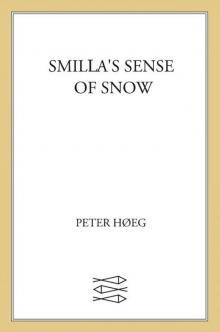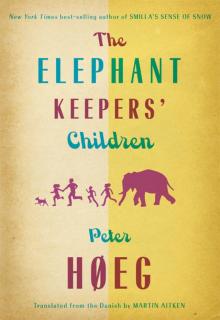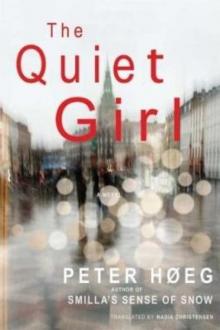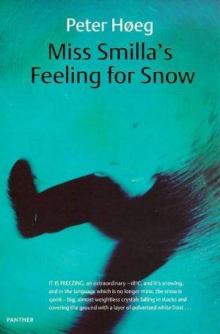- Home
- Peter Høeg
The Woman and the Ape Page 11
The Woman and the Ape Read online
Page 11
“Massachusetts,” he said. “The question of the nature of intelligence. Pioneering research—nothing to touch it. So far in front that the rest of the field was nowhere to be seen. We believed we were so close. You must understand. We were actually inside the brain itself. As far in as you can go. You don’t get any closer. It was so … staggeringly intimate. Even if they were only apes. We came so close. To becoming one. With an unknown intelligence. Picture the disappointment. When everything suddenly melts into thin air. Comes to nothing. There you are, left with that awful emptiness. While everyone around you is still living in hope. But you know it’s all over. Horror vacui.”
“Like a love affair,” said Madelene.
The vet stared at her.
“Were you there too?”
“I know how it feels.”
“You understand me,” the vet said. “Like a marriage. That’s exactly how it was. You felt cheated. Because in fact, even though I would never admit it, not to anyone, not even to you. If we had succeeded in getting to the bottom of the mind, the soul, the intellect, in decoding the brain. And if one could have placed a woman on the table. And run her into the spool…”
“Spool?”
“MRI produces a huge magnetic field. You lay people on a trolley and push them into a spool. They don’t feel a thing. She wouldn’t have felt a thing. There’s a fan heater inside it. And a mirror. And they can put on headphones. And listen to sweet music. Rosenkavalier, or some other wonderful piece. And then you would talk to her over the headphones, and say, ‘Alexander—what do you think of when you hear the name Alexander?’ And then it would be possible to stand outside and see her thoughts as they occurred; they would show up as computer images, like pixels. Penetrating further into any woman than any man has ever done. To the heart of the female psyche. She would have no chance of lying. And if there were someone else, if she had someone else, or merely thought of anyone else, it would be spotted straightaway.”
Madelene handed him her handkerchief.
“You’re sweating,” she said.
The vet mopped his brow.
“Then one might have managed to save one’s marriage,” he said.
Madelene surveyed him pityingly.
“I think it would take more than magnetic scanning to do that,” she said.
“I know, but it doesn’t stop you from hoping. It’s only human, isn’t it? Right to the last we kept on hoping. But in the end it just couldn’t be done. Because what is being measured is the oxygen consumption. And there is no formula for the relationship between oxygen consumption and cerebral activity. Nor will there ever be. No objective measurement of intelligence, no way of pinpointing thought. So we reverted to the old methods. Well, we had over eighty million dollars invested in equipment alone. And the sponsors were looking for results. So back we went to the needles.”
“Needles?”
“You know, the way it had always been done. You strap them down. The apes, that is. And remove the brainpan. The top half of the cranium. To expose the brain. And then you have these needles. Terrifically precise. Single Neuron Recording. You can pick up a single neuron. See how often it pulsates. See just exactly when a given signal passes through it. Then, of course, there are clusters of needles. Multiple Neuron Recording. We should never have dropped that system. Even though it too has its drawbacks. In order to get at any spot farther in, the needle has to be worked through the overlying tissue. And chimpanzees are getting harder to come by…”
Madelene said nothing. The doctor detected an unaccountable shift in mood but could not get a fix on it, could not catch what was being thought of him.
“The limited staying power of the big apes also posed a problem. Three weeks was the most you could count on. After that they began to deteriorate and gradually ceased to function.”
“Do you still … do that?” Madelene asked. “With the needles, I mean.”
Somewhere within the stupor into which the vet had sunk a warning light flashed, harsh and prolonged. He stopped dead.
Madelene grabbed the lapel of his white coat and drove him back toward the wall.
“Go on,” she said.
“I believe I have answered your questions.”
A low trolley caught Alexander Bowen behind the knees and he toppled backward. Madelene knelt over him.
“I have one last question,” she said.
The vet stared at her vacantly. As with every awakening from an anesthetic, this one too was nauseating and painful. And yet there was also something mysterious and deliciously illicit about this moment.
As deep down and as far back as he could go—as a boy, in the country, on Jersey—Alexander Bowen had been a genuine animal lover. He had grown up taking a delight in being close to a cat or dog, savoring the smell of a stable and deriving from the presence of cattle a peace of mind that required no explanation. He had made up his mind to become a vet and had then gone to university. And there he had learned that animals are machines. Delicate machines, to be sure, with an ingenious biological mechanism, but still—when all was said and done—machines. And faced with this revelation, his mind had, for the first time, split in two. Alongside the original Alexander, he developed a scientific alter ego. Now, when he stroked a dog’s head, this onlooker would think: What is happening here, the feelings of warmth and kindness I am experiencing, are but illusions, emergent phenomena made up of millions of processes all of which, taken singly, are quite banal and fully explained. By the time he finished his studies his nascent reductionism was fully developed and for the next thirty years he had borne the ever greater burden of that test-tube monstrosity, that inner homunculus. He had come home from the United States with the very best references and a severe case of depression. All actions—whether physical or mental—were, he knew, fundamentally chemical in nature and thus quantum electrical and hence causal and hence deterministic and all, therefore, preordained—if not haphazardly random—and so free will was an illusion, which meant that it made no difference what he did since the solution to what would happen in his life would make itself known of its own accord anyway. Which it did. One gray morning he woke up to the realization that since there is, after all, nothing behind the physical universe except a handful of elementary particles and a standard formula for explaining the interplay between the forces of nature, one might as well go all the way, and this he did—that is to say, all the way into a world which is a little—but not much—simpler than that of physics, namely the world of finance, founded upon a few basic monetary units and the four arithmetical operations. And in this environment he had stayed ever since.
Now, sprawled on the floor, he found himself being momentarily dragged out of that world, something which came as a relief. As with all of those who inhabit a purely scientific or purely financial universe, Alexander Bowen dreamt of deliverance and right now Madelene’s face was speaking to him of another sort of reality.
“The last question,” she said, “is what it would cost to be allowed to remove your brainpan and look for compassion. To see if there is any.”
For a second the vet thought he was lying in his father’s meadow, on Jersey, under the blue sky.
“More,” he said. “Do it again.”
Madelene released her hold and fished a card out of her duster-coat pocket. The blend of fatalistic resolve, self-loathing and physical discomfort produced by her withdrawal symptoms honed her actions and her choice of words to a razor edge.
“Read this,” she said. “And I’ll promise to kick you in the stomach afterward.”
It was Inspector Smailes’ card. The doctor read it slowly and with difficulty. Then the hunger, the pain and the confusion cleared from his face and it grew sober.
“He’s waiting outside.”
She took off her sunglasses.
“Mrs. Burden,” said the doctor.
Until this moment he had been convinced that this situation, like all others in his life, would ultimately prove to be under control.
That any minute now two porters would come rushing in and take this madwoman away and see to it that she paid a substantial sum in recompense for pain and suffering, in return for which the hospital would agree not to press charges and he himself would return to the meeting he had left fifteen minutes earlier. And the only reminder of what had taken place would be the hematoma he had just been dealt by the linoleum floor. Now he saw that the situation had slipped through his fingers.
Madelene pointed to the scans.
“That’s the ape, isn’t it?”
“It’s a human being.”
“Is this where it’s supposed to have the top of its skull removed? Now that Adam has given up?”
Alexander Bowen’s face had turned white, only a shade darker than the tiles on the wall.
“The Washington Convention,” Madelene said. “It’s a prison sentence for you. And a whopping great fine. And you’ll be forbidden to practice.”
The doctor moistened his lips.
“It’s a minor operation. A lot has happened in ten years. It won’t feel a thing. It will survive and be none the worse for it.”
“You examine all Bally’s animals?”
The doctor did not answer.
Madelene gathered up the banknotes and slipped them back into her coat pocket.
“I’ll have to owe you for Samson,” she said.
The dog jumped down from the table.
“You’ll call me if you change your mind?” Madelene said.
The doctor looked at her blankly.
“I mean, if on closer reflection you should decide to let me lift off the top of your skull. It would just be a minor operation. You would function quite normally afterward.”
* * *
Johnny’s truck was parked by the curb. Madelene and Samson climbed in.
“Do animals think?” asked Madelene.
They were halfway to South Hill Park before Johnny answered.
“Pit ponies,” he said. “I used to look after them, as a lad. In Morton. The mine shaft ran out for six miles under the Atlantic. You got out there by diesel train. But out by the coal face the tunnels were so narrow that only men and horses could get through. The last bit not even the ponies. There you had to crawl along on your stomach. With a lamp and a hydraulic hand drill. Six miles out and a half mile under the seabed. You couldn’t get your mind off the props. Holding up the roof. So spindly. But when you started thinking like that, that’s when you looked back. At the horse. They catch any sign of shifting long before a man would. Sense if the air supply is starting to give out. Or if there’s a leak. And they can give signals. Like people. But more subtle. If the horse was calm, everything was okay.”
“Why didn’t you leave?”
“Where would I go?”
Madelene gestured vaguely at the light, the trees, the affluence surrounding them.
Johnny gazed out the windshield. At the walls around the houses, at the closely guarded iron gates, at the fence encircling Parliament Hill.
“Would that have been any better?” he said.
For the third time in less than a week Madelene’s notions of freedom listed to one side; then they keeled over and started to break up.
“You got used to the heat. To working lying down. To the air. To the fact that there’s no room to move. The hard bit was being alone. Because there wasn’t a sound to be heard. It’s dead quiet. And suddenly you feel that you’ve been deserted. That you’re the last person alive on earth. A half mile down. That was when you shoved the lamp back and looked at the horse. Its muzzle was all black. Like your own face. Its eyes glittered. Like your own. It was the same as you. But perfectly calm. Not because it was stupid. But because it wasn’t thinking unnecessary thoughts. It wasn’t thinking about yesterday, or tomorrow. Nor closing time or the Third World War. It was thinking about here and now. And looking at it, you began to feel the way it did. And then you grew quite calm. And sometimes … almost happy. Like when I drove the animals. Most of the time your thoughts flit about all over the place. Yesterday. Tomorrow. Problems, problems. But transporting Bally’s animals you didn’t think about anything but the driving. No loneliness. And behind you in the dark, their eyes glittering, you could feel them. Fine, powerful, strange. To be protected. You couldn’t make the slightest mistake. Or there would be a cave-in. Your mind was one hundred percent on the job, and there, on the road, you were … you became…”
“Almost happy,” said Madelene.
They sat there, saying nothing.
At last Madelene opened the door.
“Tomorrow,” she said. “We have to get it out before tomorrow. If it’s to have any brain left for not thinking unnecessary thoughts.”
She looked up at Johnny and the dog.
“You two will be here this evening?” she said. “Won’t you? You’re not suddenly going to take off back to Morton?”
“They closed down the pit in ‘85. That was all there was to Morton, the pit. There’s nothing to go back to.”
thirteen
That evening Adam ate with Madelene for the first time in five days and, seen from a distance, he seemed loving and attentive.
But Madelene was not seeing him from a distance. She was seeing him at very close range, and, closer still, she was also seeing him from the inside, from a mistress’s point of view, and what she saw was his absence. Even though he was sitting opposite her, Adam had not put in a personal appearance at the table. His mind had stayed behind in the laboratory with the ape.
This was not a new state of affairs for Madelene. What was new was that she found it less than satisfactory. After the first few minutes she was in no condition to eat or talk and she did not utter one word until the point when they climbed the stairs together and stood outside the door to his rooms and he reached out for her and she pushed his hand away.
“No way,” she said.
Then Adam Burden reentered his body.
Before he met Madelene, Adam had had a number of relationships which, in retrospect, he either could not or did not wish to tell apart. It seemed to him that all of those girls—despite being in their twenties and thirties—had had babyish voices and bedrooms full of cuddly toys, that they dreamt of his turning out to be yet another teddy bear, and that—once he had afforded them a glimpse of the mere shadow of his desire—they had been smitten by mystified panic.
Madelene had been different. The very first time he reached out for her, she had taken on an air of languorous, slack-limbed menace. With half-closed eyes she had watched him dancing closer and when at long last she had chosen to respond to him her response had been wholehearted. Adam had had no antibodies to combat these moments of female lust, so suddenly aroused only, afterward, to sink without a trace. Madelene had invaded his bloodstream like a fleeting attack of blood poisoning. By the end of their first whole day together he was a sick man. When she spurned him for the first time his sickness was rendered incurable.
For an instant, there on the landing, his face glowed with the sort of hate that moves people to commit murder. But it never found an outlet. The emotion flared up for a split second, then it was doused and his figure hardened into an excruciating encapsulation of the situation thus presented.
It was then that Madelene was struck, for the first time, by the thought that she was too much for her husband. If one is to survive an attack of desire of the kind by which Adam had been struck, one must be able to cope with rejection. For every time that Madelene said yes to him there were three more when she turned her back on him, and she now had a suspicion that he could not bear this, and never had been able to. He was a winner, a born winner, who had in her come up against the trouncing of his life and, what is more, a trouncing which was not to be suffered once and once only, but had to be played out again and again like some cyclically recurring annihilation.
For a moment Adam just stood there. Then he turned around, slowly and stiffly, and went into his room.
* * *
Once the door ha
d slammed behind him he walked over to the window, opened it and—as was his habit in situations such as this—committed the first of a series of murders.
From the moment he first laid eyes on Madelene, Adam had been dazed, shell-shocked by jealousy. He was convinced that she was a danger not just to himself but that she constituted a threat to mankind as a whole, that any man would give his life to get inside her. Consequently he had appointed himself to be not only her husband but also her bodyguard and eunuch and if he could have infiltrated her soul he would have been her thought police too.
Now, standing by the window, he fantasized that he had been caught napping and that she had succeeded in taking a lover and smuggled him into her room. Lingeringly, he grilled his imagination over the spectacle of their undressing and the opening moves in their lovemaking, at which point he himself stepped in armed with his father’s double-barreled Purdy and discharged both barrels, three hundred and fifty pieces of lead shot at a range of ten feet. This done, he then wallowed in his own despair over all that was left of Madelene.
This first killing mollified him slightly, and so he committed another, and yet another—feeling a little better with each one. In his normal, pragmatic state of mind he would, with some pride, have described himself as totally lacking in imagination, but during the half hour he spent by the window like a lone executioner his fantasies acquired an artistic lifelikeness that made it hard to separate them from reality. When he spied Madelene gliding across the lawn, light-footed as an elf maid, he thought at first that he was gazing upon his own, inner stage. Not until she opened the little gate in the wall around the grounds and let in a man did Adam observe that this fantasy did not have the same liberating effect as the others.
The moon was on the wane, the sky somewhat overcast. In such a light it was impossible to make out any details. Although, in his present condition, even broad daylight would hardly have been strong enough for that. He could not see Johnny clearly, did not see the collapsible wheelchair he carried. All he saw were the contours of a short, thickset gnome with a hunchback.

 The Woman and the Ape
The Woman and the Ape Smilla's Sense of Snow
Smilla's Sense of Snow Borderliners
Borderliners The Susan Effect
The Susan Effect The History of Danish Dreams
The History of Danish Dreams The Elephant Keepers' Children
The Elephant Keepers' Children The Quiet Girl - Peter Hoeg
The Quiet Girl - Peter Hoeg Smilla's Sense of Snow aka Miss Smilla's Feeling for Snow
Smilla's Sense of Snow aka Miss Smilla's Feeling for Snow